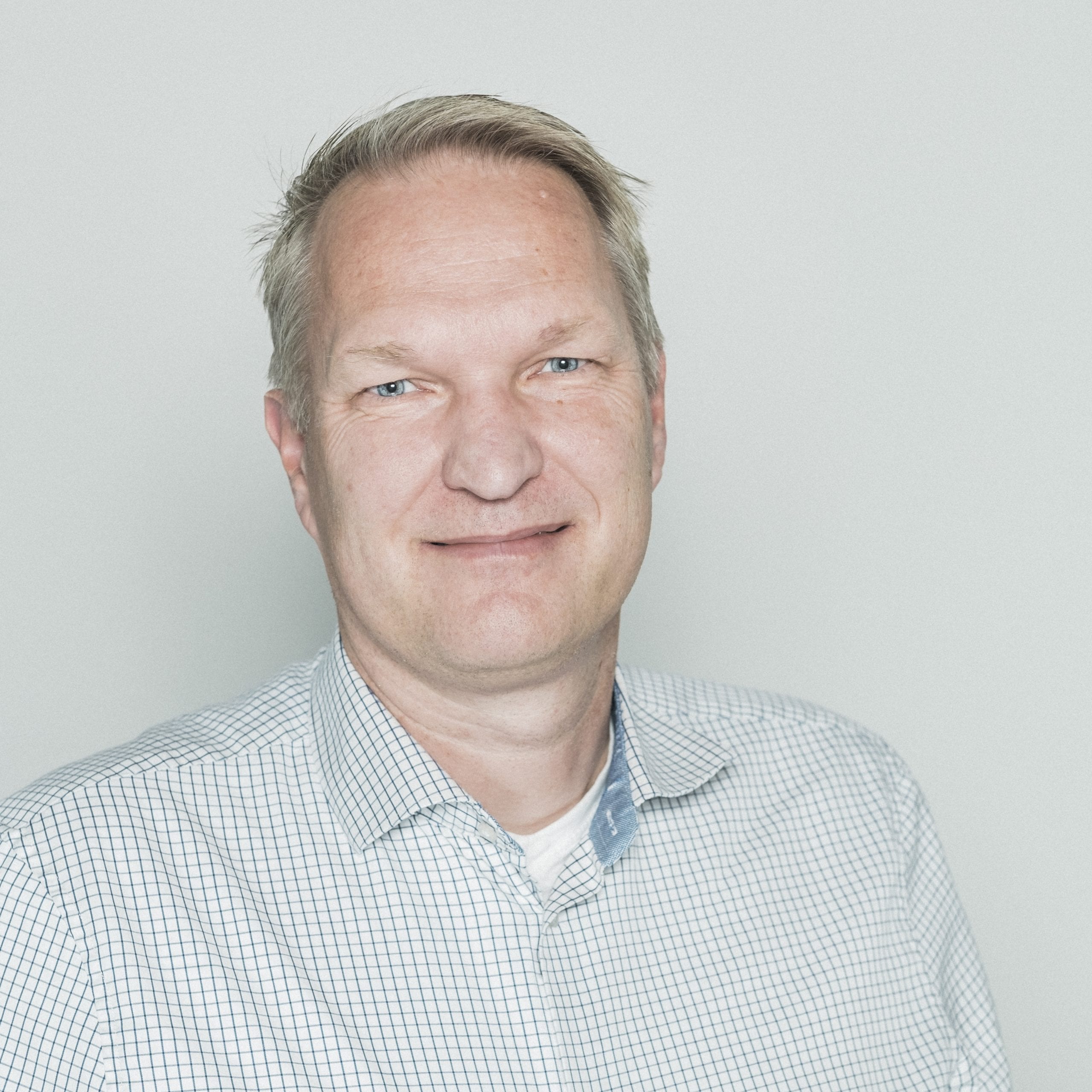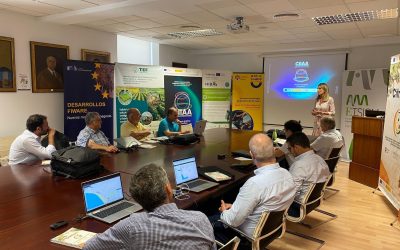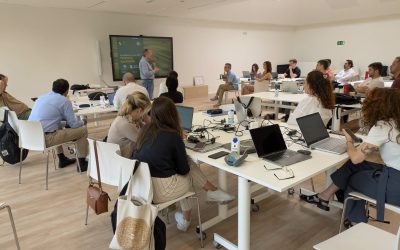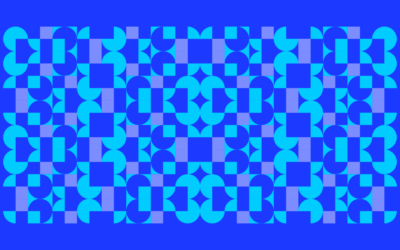WISDOM ACROSS THE BOARD // INTERVIEW #7
A couple of weeks ago, this interview series covered the profile of Antonello Monti, the Chairman of FIWARE Foundation’s Smart Energy Mission Support Committee. This week, we had the pleasure of sitting down with Arjen Hof, a member of the FIWARE Foundation Smart Cities Mission Support Committee, and Director at Civity. As Smart Cities throw in digital intelligence to existing urban systems, making cities more resilient, efficient, and better engaged with their citizens (among many other areas), the industry domain isn’t exactly short of challenges. Throughout the interview, we will get Arjen’s perspective on the matter and discuss what lies in store for FIWARE’s Smart Cities Mission Support Committee. Before we dig deep into that, let’s get to know Arjen a tiny bit.
 Arjen studied environmental urban planning and graduated in 1996. After writing his thesis on “Sustainable new neighbourhoods”, the topic became a constant in his life: for him, a really smart society is inclusive, sustainable, and livable for all its inhabitants. He went on to work for sustainable urban development in several cities in the Netherlands and the possibilities of technology – and how it could contribute or enable sustainable development on a local scale – has always intrigued him. This fascination led him to move towards E-government, first as the head of an innovation program focused on digital services in Amsterdam and later, in the shape of a cooperation between Dutch municipalities to implement standardized software for municipal service delivery.
Arjen studied environmental urban planning and graduated in 1996. After writing his thesis on “Sustainable new neighbourhoods”, the topic became a constant in his life: for him, a really smart society is inclusive, sustainable, and livable for all its inhabitants. He went on to work for sustainable urban development in several cities in the Netherlands and the possibilities of technology – and how it could contribute or enable sustainable development on a local scale – has always intrigued him. This fascination led him to move towards E-government, first as the head of an innovation program focused on digital services in Amsterdam and later, in the shape of a cooperation between Dutch municipalities to implement standardized software for municipal service delivery.
In 2013, Arjen founded Civity and went back to his favourite topic: the intersection of urban development, data, and technology. On a more personal note, he likes to take long walks and cycle, and during the current COVID-10 pandemic, Arjen has discovered new things about his home country, the Netherlands. Arjen argues that despite it being a small country, the wonderful nature, historic cities and the quiet countryside have been inspiring him extensively.
The interview has been edited for length and clarity.
FIWARE Foundation: Why did you want to be on FIWARE Foundation’s Smart Cities Mission Support Committee?
Arjen Hof: In 2016, Civity was one of the founding parties of the Dutch FIWARE Lab. It was then called Stichting FIWARE Lab and then got renamed Future City Foundation (one of FIWARE’s worldwide iHubs) and I also took the initiative to help several Dutch cities to join the Open & Agile Smart Cities – OASC, a non-profit, international smart city network that has the goal of creating and shaping the nascent global smart city data and services market. I strongly believe that challenges across cities are quite similar. We should share solutions, data and knowledge to prevent reinventing the wheel: we should rather adapt solutions that are available. To achieve this, we need open standards, data models and Open Source software.
At Civity, we have built our open urban platform with FIWARE technology. In two European projects (IRIS and SCOREwater) this platform is the foundation for new, innovative solutions. During implementation, we recognized that open standards, generic data models and solutions for viable business models were missing. The Front-Runner Smart City program, jointly launched by FIWARE Foundation and TM Forum is a great opportunity to address these topics and collaborate with cities across Europe on reusable solutions. The best way to grow businesses is to work together, be open about sharing best practices and knowledge. For instance, we work closely with Sensative, a Swedish-based IoT company (and a FIWARE Gold Member), as we share the same vision, not only on the technology front, but also on strategy, standards and communication. Thus, joining FIWARE Foundation’s Smart Cities Mission Support Committee was a natural step for me. It is the place where we can connect the dots, discuss technology, strategy and vision for the foundation and address the challenges faced by Smart Cities in detail (and how the foundation can help).
FIWARE Foundation: What experiences do you bring from your current role and your career to date that would be valuable to the foundation?
Arjen Hof: I worked for over 15 years in local government and I know that collaboration between cities takes a lot of effort. First, everyone agrees on standards, then when you ask people to show real commitment, it’s another story. From my experience, we need a twofold approach: A top-down strategy – with regulations and legal agreements – is time-consuming but needed in order to secure results. A bottom-up approach focuses on a coalition of the concrete, visible results. It’s needed to convince others and show the benefits. Seeing is believing. Hence, my experience and broad network in local government – in combination with my knowledge of urban platforms and data – will help the foundation to bridge the gap between the business-side and the technology-side. The members of the Committee are involved in real projects and the learnings from these projects will help the foundation to improve its tools and gain broader market recognition and adoption.
FIWARE Foundation: Being a member of the Mission Support Committee presents trials of many kinds because it requires being attuned to people (including those who are at various levels of the foundation hierarchy) and handling a large variety of tasks on top of your work at Civity. What would you say are the main challenges and opportunities when doing Mission Support Committee work at the foundation?
Arjen Hof: First of all, I support the FIWARE philosophy because I think it’s the only way to flourish as a company in an open, federative, connected world. That’s Civity’s DNA. At the same time, we are doers. We like to build things and implement them. Nevertheless, contributing to committees, working groups, and other initiatives always clashes with our own projects. Thus, balancing the short term efforts and the long-term gains is a constant challenge. If you work in a broad domain such as “Smart Cities”, there are multiple opportunities arising each day, and everything is connected. For example, climate adaptation needs to look at mobility, it requires an energy-transition and a rethinking of our food production. I strongly believe that we need this interdisciplinary approach to achieve a truly smart society. But you can’t do everything at once. Adding the opportunities presented by the Smart Cities Mission Support Committee to our business and then use them in the (further) development of our platform requires that we have actual use cases for implementation. So, the current work in the Mission Support Committee lays the groundwork. It is research-based and it is creating the building blocks for implementation. Using these results in day-to-day activities requires endurance and finding the right business models and collaboration between public and private organisations.
FIWARE Foundation: What has been the greatest achievement/most successful moment with the work you are leading at the Committee so far?
Arjen Hof: I think I should show some modesty here. We are still in the early phase with the Committee and achieving sustainable results will need perseverance and time. There are some interesting initiatives going on, not least with regards to data models for water management and energy-related topics, like the EV-charging stations. Multiple EU-projects are now adopting FIWARE technologies and contributing to data models. At Civity, we are involved in two of these projects (IRIS and SCOREwater) and see that results from standardisation across different domains are taking effect. But we still have a lot of work to do.
FIWARE Foundation: From your perspective, what are the biggest strengths and challenges for the Smart Cities domain in the upcoming years? What role does Open Source play in overcoming the challenging scenarios?
Arjen Hof: Throughout history, people have always tried to shape a city around the means that were available at that time. We do the same these days. And 100 years from now there will be other resources. We now have the ability to use technology and data to improve decision-making and quality of life. When you look at the challenges that we face now, topics such as climate adaptation, healthy urban living, energy transition, and mobility are some of the most pressing issues. They all relate to each other, they should not be singled out. Moreover, the role played by different stakeholders (municipality, housing corporations, energy companies, etc.) is changing and new local (citizen-driven) corporations will arise. All these factors need to be added to the equation if we are to move towards real smarter environments. City planning and development require collaboration and experience sharing and we have to recognize that we still know very little about how cities work. We install sensors, collect data, and build dashboards, but the transition into meaningful measures – that actually improve the lives of citizens – is in its early phase. Enabling society as a whole to participate in the process of shaping the future of a city, providing equal access to data, and a clear understanding of its use and meaning – and how to adapt to these ever-changing scenarios – are the biggest challenges for the foundation for the coming years. From that perspective, it will be increasingly important to use Open Source and open standards, because we need agility and flexibility to adapt to ever-changing circumstances. I believe that FIWARE is well-positioned to provide the right means to address these challenges, given its outstanding work on both fronts.
FIWARE Foundation: Finally, where do you see the foundation in three years from now what will your contribution to its further growth be?
Arjen Hof: When I look at FIWARE Foundation’s goal of driving the definition of open standards (implemented using Open Source technologies) to ease the development of smart solutions across many domains, in a faster, easier, interoperable and affordable way that avoids vendor lock-in scenarios, it’s rather difficult not to be excited about it. However, anybody looking at the foundation’s work at a first glance may find it difficult to fully grasp how the foundation actively helps cities with policy-making or in the management of public spaces. For example, when I go to municipalities, they mainly seem interested in the human side of data sharing. What I am trying to say here is that, although FIWARE is known about its technology, from a local government standpoint, it would be great to see more activities focused on real urban challenges. With Civity, we have created visible showcases, such as the Snifferbike-project (a Connecting Europe Facility successful story), which provides indispensable data on the current state of the environment, which is essential for policymakers tackling environmental and mobility issues, as well as local research agencies, in order to create a healthy urban space for all. We have used FIWARE technology, have applied open standards and adopted generic data models, but it feels like the plumbing in your house: it’s needed – but invisible – and people often prefer to talk about their new bathroom, instead of the underlying sewage system. What makes our project a success is that we constantly connect with all stakeholders in the process: government agencies, sensor suppliers, research institutes, citizens, scholars, data science companies. Building open urban platforms should be a collaborative effort. You cannot simply define in a plan on how to build an ecosystem but should apply a mindset in projects that enables the participation of all stakeholders.
Hence, the way I would like to contribute to the foundation’s further growth is by guiding the organization towards striking a balance between the technology side and the development of standards and data models that can ease the research into the “good city form”, a concept used by Kevin Lynch in the book ‘A Theory of Good City Form’, which has really shaped my thinking on the subject. The need for guidelines and rules that enable a level playing field, create transparency about data-usage in algorithms and provide a clear ethics framework is essential to achieve this scenario. In this aspect, the foundation has quite a lot to contribute to. Following its joint standardisation activities with ETSI (NGSI-LD API specifications), W3C (Web of Things), GSMA (IoT Big Data Ecosystem project), TM Forum (via the Front-runner Smart Cities program), the International Data Spaces Association Reference Architecture Model (IDS-RAM 3.0), FIWARE Foundation and its Community have been actively contributing to the important dialog between all stakeholders in society. And there is room for further work. In a general sense, focusing on supporting societies to develop their smart digital journey – and coming to terms with the changes brought by the digital revolution – presents an exciting opportunity for the foundation and I can see a promising path here. As a member of one of its Mission Supporting Committees, I am thrilled to be part of this journey and be able to contribute to it with my expertise and global network.
Stay tuned as next week we talk to Ernö Kovacs, the Co-chairman of the FIWARE Foundation Smart industry Mission Support Committee and Head of IoT Research at NEC Labs Europe, NEC Europe Ltd.



